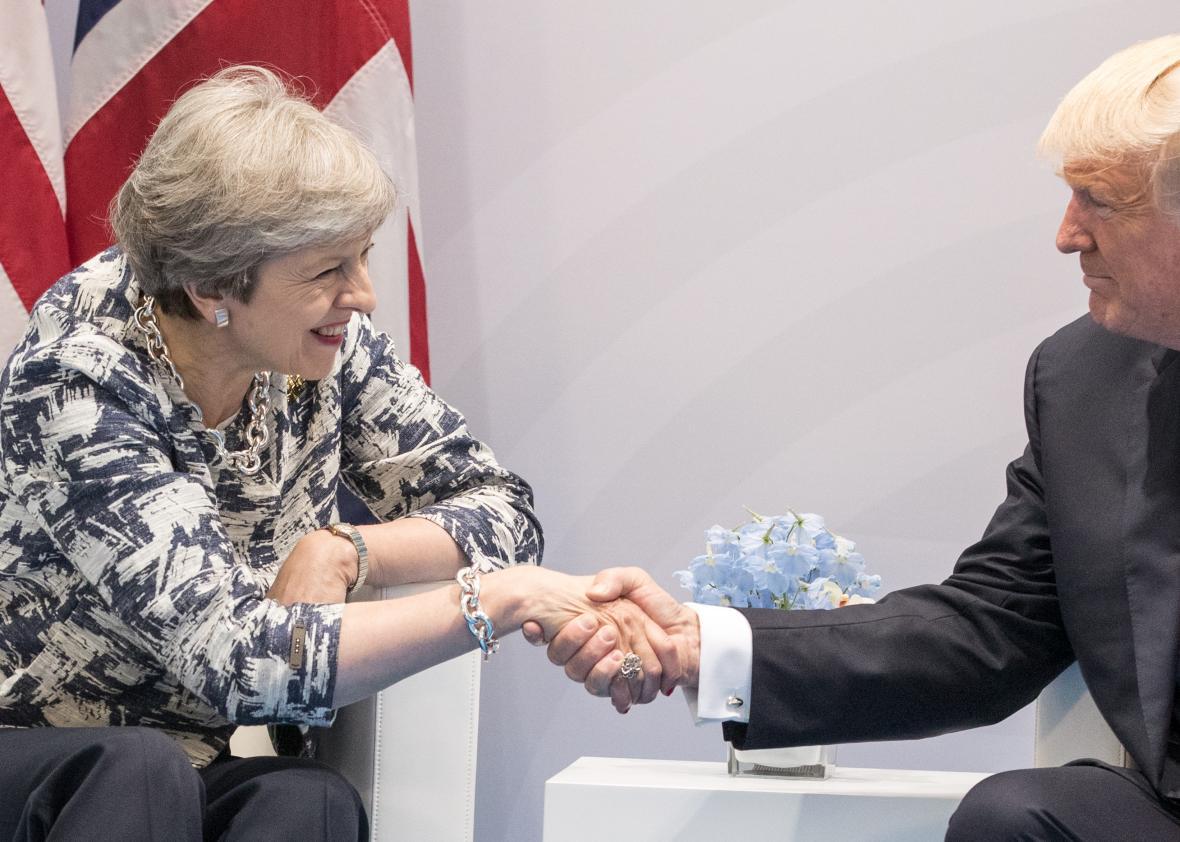Want to listen to this article out loud? Hear it on Slate Voice.
When asked about President Trump’s equivocating response to the racist rallies and violence in Charlottesville, Virginia, last weekend, British Prime Minister Theresa May said on Wednesday that there is “no equivalence between those who propound fascist views and those who oppose them” and that “it is important for all those in positions of responsibility to condemn far-right views wherever we hear them.”
Opposition lawmakers want her to go further and have renewed calls for May to withdraw the invitation she issued to Trump in January to make a state visit to Britain later this year. (Foreign Secretary Boris Johnson bafflingly defended that invitation at the time by pointing out that Robert Mugabe had also once made a state visit.)
Trump presents a no-win situation for May. Her government still hopes to forge a post-Brexit trade deal with the United States, so she can’t exactly afford to completely alienate a president who seems to set trade policy based on personal animus. On the other hand, Trump is deeply disliked by the British public and every new outrage provides May’s opponents with easy ammunition to use against her at a time when her political position is precarious, to say the least. If and when it ever happens, the state visit is going to be deeply uncomfortable.
May’s not the only leader struggling with how to approach Trump. France’s Emmanuel Macron came to power vowing to stand up to the U.S. president and strongly criticized his stance on climate change, but then turned on the charm during a pomp-filled Bastille Day visit last month. Macron’s embrace of the deeply unpopular Trump is not the main reason for the French president’s plummeting popularity, but it certainly didn’t help. Macron, who has gone further than most French leaders in acknowledging France’s historical sins during the Holocaust and War in Algeria, hasn’t yet commented on Charlottesville.
Canada’s Justin Trudeau seems to have settled on a strategy of embracing Trump personally while making statements that implicitly distance himself from the president’s policies. Just as he tweeted that Canada was open to refugees and that “diversity is our strength” following Trump’s travel ban, he has responded to Charlottesville with a statement condemning “violence and hate.”
Ironically, this strategy has done more for Trudeau’s popularity in the United States, where he’s acquired folk hero status as a handsome charismatic anti-Trump, than in Canada, where views are more mixed.
Germany’s Angela Merkel has been distancing herself from Trump, who has repeatedly attacked her on refugee policy and other issues, since Day 1 of her presidency, and seems to have more or less given up on the prospect of a productive relationship with his administration. A spokesman for the chancellor, who is likely to win reelection next month, condemned the “right-wing extremist march” in Charlottesville as “repulsive,” “evil,” and “disgusting.”
One less direct but in some ways more interesting response to this week’s events came from the foreign ministry of China, which was responding to the U.S. State Department’s annual report on religious freedom and a statement by Secretary of State Rex Tillerson condemning Beijing’s treatment of religious minorities. Spokesperson Hua Chunying advised the U.S. government to look after its own problems and noted, without elaborating, that “everyone has seen that the facts prove the United States is not totally perfect.”
